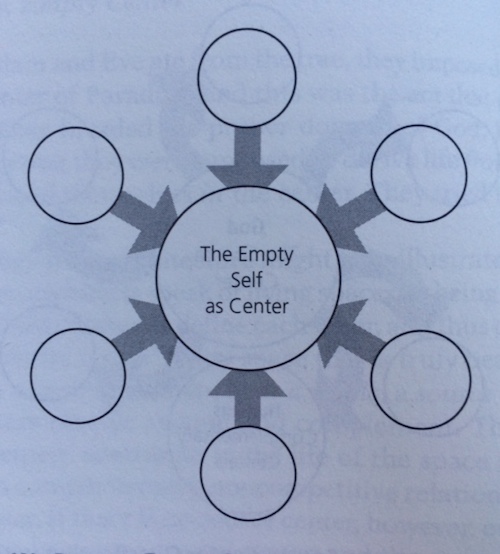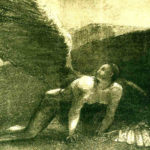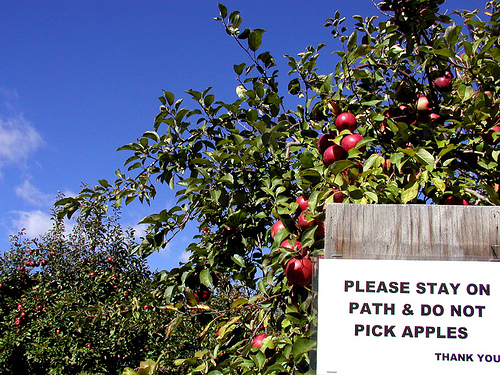We run our website the way we wished the whole internet worked: we provide high quality original content with no ads. We are funded solely by your direct support. Please consider supporting this project.
What Went Wrong in the Garden of Eden?
When Adam and Eve ate from the tree, they imposed their will into the center of Paradise, and this was the act that destroyed Paradise. They invaded the proper domain of God. Instead of recognizing that they were supposed to derive life from the center, they placed themselves in the center. They tried to become “like God.”
The beauty of creation depends on the integrity of the distinction between the complementary centers and the source of the center. The “No Trespassing” sign placed at the center of the garden represents the warning to preserve this boundary and thus the order, beauty, and life of creation. Everything depends on humans remaining humans and not trying to be God—not trying to be their own source center.

Adam and Eve violated this boundary. They thrust themselves into the center of the garden to try to make themselves “wise like God.” They tried to design their own space, as it were, with themselves as the center. And we do the same. We try to make creation—and God—revolve around us. Instead of remaining content being complementary centers, we try to make everything complement us. We attempt to use things and people to derive our worth, meet our needs and expectations, or improve our lives in some way. And we “know good and evil” in the process, for we invariably judge things as “good” or “evil” on the basis of how well they play the idolatrous role we assign them.
Living as the source center means living as judge. But we were not created to function as the source center. We were created to function as complementary centers. We have no life in ourselves to dispense to other centers. Consequently, our center is not one of fullness but of emptiness. Without God as our center, we are not a source of life but a vacuum that sucks life. We can’t radiate life in other centers; we can only try to draw life from them. The world and God revolve around us, and we become a virtual black hole, as depicted by the diagram below.

It is out of the depravity of this black hole that we function as a center, playing God, judging good and evil.
This is life “in the flesh” or life “in Adam.” It is life lived under the serpent’s lie and thus life lived as though we were the center. This way of life is diametrically opposed to God, for it makes it impossible for the fullness of God’s love to flow into us and through us.
In this fallen way of life, people and things have worth only to the extent that they fill us. Instead of ascribing unsurpassable worth to others because the Creator does, we ascribe limited worth to people depending on our judgment of them. Do these people love me? Do they please me? Do they benefit me? Do they affirm me? Do they agree with my opinions? We are the ones who declare that someone or something is good or evil, for we have set ourselves up as the center around which everything revolves and, therefore, the standard against which everything is measured.
—Adapted from Repenting of Religion, pages 68-71
Category: General
Tags: Garden of Eden, Idolatry, Judgment, Repenting of Religion, Sin, Temptation
Topics: Creation Care
Related Reading

Sending Evil Spirits
In several infamous biblical depictions of Yahweh in the Old Testament, God is depicted as “sending” spirits to trouble and/or deceive people (Judg 9:22-3; 1 Sam 16:14, 23; 18:10; 19:9; 1 Kg 22:20-3). While there are several exegetical considerations that arguably help alleviate the problematic way these passages implicate God in unethical behavior, I nevertheless…

The Patriot’s Bible — Really?
Have you ever seen the Saturday Night Live skit entitled “Really? With Seth and Amy”? Sometimes it’s pretty funny. I was thinking that perhaps the best way to get through my critique of The American Patriot’s Bible (henceforth Patriot’s Bible) would be to give a “Really?” type report on it. I want to preface my…

Podcast: What Will Keep Us from Falling Away in Heaven?
Greg talks heaven and hell in this solid little episode. http://traffic.libsyn.com/askgregboyd/Episode_0393.mp3 Painting: Fallen Angel By: Odilon Redon Date: 1872

Love Conquers All
Paul prayed in this way for the church at Ephesus: I pray that, according to the riches of his glory, [God] may grant that you may be strengthened in your inner being with power through his Spirit, and that Christ may dwell in your hearts through faith, as you are being rooted and grounded in…

How Judging Blocks Love
What keeps us from fulfilling the law of love that is exemplified by Jesus and laid out in the Scriptures (Matt. 22:39-40; Rom 13:8,10 Gal 5:14)? In a word, we like to pass verdicts. To some extent, we get our sense of worth from attaching worth or detracting worth from others, based on what we…

Did the Fall Really Happen? (podcast)
Greg speculates on the nature of the fall, then talks about evidence of God in the universe. Episode 520 http://traffic.libsyn.com/askgregboyd/Episode_0520.mp3

